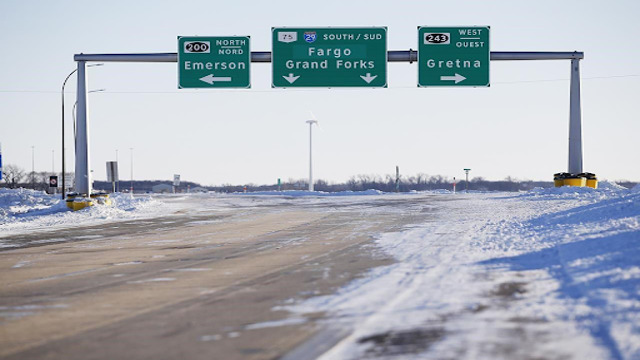
A road sign is displayed just outside Emerson, Manitoba, on January 20, 2022. The Canadian Press
Indian law enforcement agencies have launched an investigation into alleged links between several Canadian colleges and two organizations in Mumbai that are accused of facilitating the illegal transportation of students across the Canada-U.S. border. The investigation, which has uncovered evidence of human trafficking, was sparked by a tragic incident in January 2022, where a family of four, including Jagdish Baldevbhai Patel, was found dead near the border crossing between Manitoba and the United States.
According to the Indian Enforcement Directorate, the search last week in Mumbai, Nagpur, Gandhinagar, and Vadodara resulted in incriminating findings. The government body suggested that Bhavesh Ashokbhai Patel, one of the key figures in the operation, had orchestrated a network that arranged student admissions to Canadian colleges. However, instead of attending these institutions, the students were reportedly smuggled across the U.S. border.
The Patel family’s death was part of a broader case, known as the Dingucha case, named after the village in Gujarat, where the family originated. The case raised concerns about an extensive trafficking network that allegedly charged between $93,000 and $102,000 for each individual to cross the border illegally. The family had paid these fees in hopes of migrating to the U.S., but tragically, they perished in the harsh cold after illegally crossing the border.
The investigation has uncovered that Bhavesh Patel's operation involved a large number of students being referred to various Canadian colleges, which were allegedly complicit in the scheme. Once the students arrived in Canada, instead of attending school, they crossed the U.S. border illegally. The fees paid for their college admissions were reportedly refunded afterward.
The Enforcement Directorate has claimed that nearly 25,000 students were referred by one organization and over 10,000 by another each year. The network, spread across India, involved around 1,700 agents in Gujarat and 3,500 nationwide, with approximately 800 agents still actively operating. Additionally, the release claims that at least 112 Canadian colleges had agreements with one organization, while more than 150 colleges were connected to the other.
While the investigation is ongoing, it is not clear whether any of the implicated colleges were aware of the students’ intentions to illegally cross the U.S. border. The details of the colleges involved have not been fully disclosed.
Anil Pratham, a retired senior police officer in Gujarat, stated that the investigation had been difficult, taking nearly three years to piece together. He explained how his team examined student application documents and sought help from the local community to identify the agents involved in the operation. His work was supported by authorities in Canada and New York.
The investigation comes amid heightened tensions between India and the U.S. over border security issues and diplomatic strains between Canada and India. These tensions are exacerbated by the ongoing concern over illegal immigration, with U.S. President-elect Donald Trump threatening tariffs if Canada does not tighten its border security. Canada has already allocated significant resources to addressing these concerns, even as the two countries continue to clash over other matters, such as India's alleged surveillance of Sikh separatists.
As this investigation unfolds, authorities are urging individuals to use legal means to pursue education or work abroad, rather than falling prey to illegal trafficking schemes.















